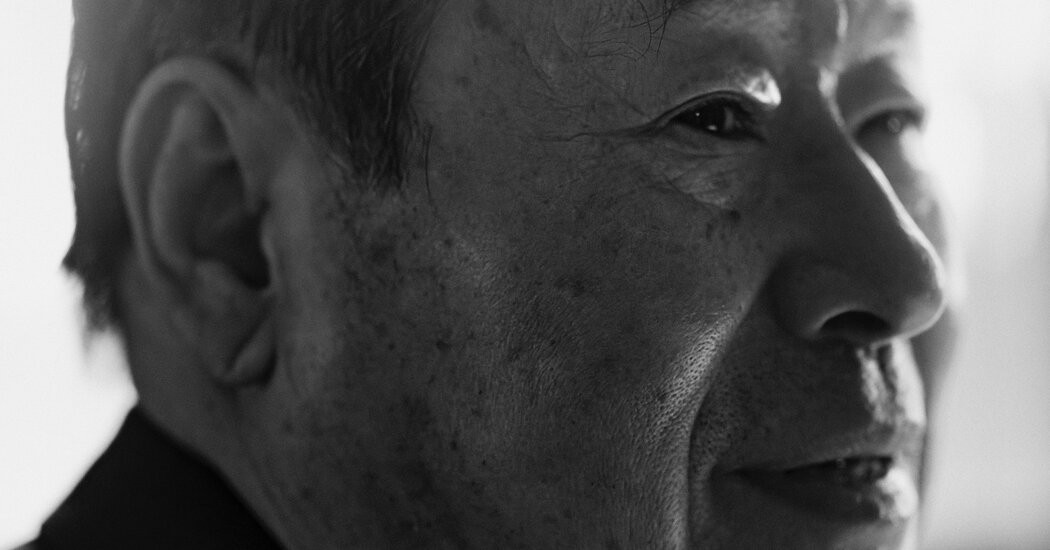

One morning in late July last year, Shujun Wang shuffled into a courtroom at the federal courthouse in Brooklyn, leaning on his cane as he made his way to the defense table. Settling into a seat next to his lawyers, the 76-year-old Chinese American scholar smoothed his jet-black hair and adjusted his tie, whose red-and-blue pattern, set against his white shirt, vaguely suggested the American flag. After an exchange of greetings with his Chinese interpreter, he surveyed the courtroom with an amused expression, almost beaming at the visitors’ gallery. For someone facing trial on charges of working as an illegal agent for China, Wang looked remarkably cheerful. It was hard to say if he was oblivious to the gravity of his situation or pleased to be the center of attention.
The government accused Wang of having led a double life for years. A historian who migrated to the United States from China in 1994, he had written many books on military and naval history, including one about the heroism of the U.S. Navy in the Pacific during the Second World War. Starting in the mid-2000s, he had also been a member of a community of Chinese dissidents in the United States who oppose the Chinese Communist Party and push for democratic reforms in China. Wang helped organize events and rallies in the greater New York area to commemorate the Tiananmen Square massacre and protest the authoritarianism of the Chinese government. In 2006, he founded, with a group of prominent dissidents, a nonprofit in Flushing, Queens, called the Hu Yaobang and Zhao Ziyang Memorial Foundation, with the mission of promoting democracy in China. Warm and affable, Wang became a recognizable face within the organization, managing its media relations and working to publicize the foundation’s activities in New York’s Chinese-language newspapers.
Secretly, according to federal investigators, he was working for China’s Ministry of State Security. Evidence presented at trial by federal prosecutors from the Eastern District of New York would show that at the direction of his handlers in the M.S.S., Wang spied on Chinese dissidents in Flushing and the New York area for years. His enthusiastic participation in the Chinese pro-democracy movement appeared to have been a ploy to gain proximity to its leaders and activists and to collect information about them for the ministry. United States authorities say the Chinese government uses such intelligence to intimidate and silence dissidents overseas.
Like other authoritarian regimes, China’s communist government is anxious about potential challenges to its power. Since becoming president in 2013, Xi Jinping has emphasized the need for China to take lessons from the collapse of the Soviet Union, which Chinese scholars have attributed in part to ideological decay brought on by Western influence. An internal directive of the Chinese Communist Party released that year warned its workers to remain vigilant against “Western constitutional democracy” and other corrupting ideas. The document also claimed that the West was trying to engineer “color revolutions” in China — a term for popular uprisings in several former Soviet republics during the 2000s that came to be known by colorful names like the Rose Revolution in Georgia and the Orange Revolution in Ukraine.
How intensely China has sought to monitor and counter such perceived threats can be gauged by a series of cases of Chinese spying and influence-peddling in the United States that have come to light in recent years. In November, a man named John Chen was sentenced to 20 months in prison for acting as an unregistered agent for China and bribing an undercover officer posing as an I.R.S. official in a plot directed against U.S.-based practitioners of Falun Gong, a movement that the Chinese government regards as a threat. In September, the Justice Department unsealed an indictment against Linda Sun — a former aide to Gov. Kathy Hochul of New York — charging her with, among other allegations, failing to register as an agent of the Chinese government, from which she received financial benefits amounting to millions of dollars. Sun is accused of using her position to further China’s interests. At the bidding of Chinese officials, for example, she is said to have removed any mention of the plight of China’s Uyghurs from a 2021 speech by Hochul, who was New York’s lieutenant governor at the time. She is also accused of blocking Taiwanese government officials from communicating with Hochul and other senior New York State officers.